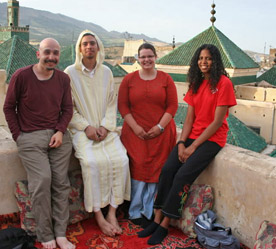Islamic studies drew Ogren-Gunderson to Cornell
A course studying Islam in Morocco drew Alida Ogren-Gunderson to Cornell, and the trip proved to be everything she’d hoped for. She’s also found plenty of other opportunities to feed her passion for Islamic studies, including three months of intensive Arabic study on campus and in Egypt during her final semester.

Alida Ogren-Gunderson surprised herself by falling in love with the study of religion — particularly Islam — at Concordia College. She longed to explore Islam more deeply, and a professor suggested she consider transferring to Cornell College.
Partners in scholarship
When she learned that religion professor Steven Sacks would be co-leading a 2009 course in Morocco to study the effects of postcoloniality on Islam, she was hooked. At Cornell, she first took Sacks’ course Israel and Torah, and the two quickly formed a deep mentoring relationship.
“I immediately sensed in him a combination of brilliance and humanity that motivated me to give him my very best,” she said. “I worked hard for Dr. Sacks and in turn he treated me like a partner in scholarship.”
Three months later, Sacks suggested that she study a challenging Muslim thinker named Ibn al-‘Arabi for her capstone thesis project.
“Dr. Sacks admitted that it was particularly intimidating to take on the maddening genius of a man like Ibn al-‘Arabi in such a short course, but he encouraged me to try. I absolutely lost myself in the thoughts and ideas of this brilliant medieval philosopher and poet, and in the end I produced a paper entitled “The Eye and the Sight: Duality and unity in the thought of Ibn al-‘Arabi.”
Islam and Postcoloniality in Morocco
Next stop: Morocco. Looking back, Ogren-Gunderson called the month-long course “the most amazing experience of my life.” She enjoyed new experiences such as dancing at a Berber wedding and hearing daily calls to prayer, and she particularly delighted in her lengthy conversation with a Sufi leader named Ibrahim Khalil Tijani.
“As we sat on the rooftop, gazing out at the green tiled roofs around us and listening to the chanting of his Sufi brothers below us, we discussed topics ranging from his childhood to his future duties as a shaykh of the Tariqa Tijaniyya and his religious beliefs. Following our conversation, I critically analyzed his religious beliefs in relationship with the dominant Salafist ideology as my final project for the class. It was an incredible opportunity that I never could have even dreamed of, yet there I was, speaking informally with the future leader of 200 million Muslims around the world.”
Arabic language immersion
The last semester of her senior year will be an immersion in the Arabic language, first through a Cornell course and then through two months of study in Cairo, funded by a Benjamin Gilman Scholarship for International Education. After graduation she plans to pursue a doctorate in Islamic studies with the goal of bridging the cultural and communication divides between the Muslim world and the West.
“I have a deep respect for Islam, and I am pained by the ignorance and misconceptions that can so frequently prevent sincere dialogue. I plan to dedicate myself and my career to correcting these misconceptions by building relationships with the Islamic world that I will maintain throughout my life, as a student and eventually as an educator.”



